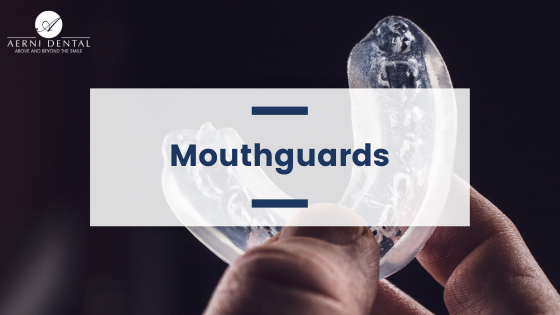Athletic Mouthguards
Protecting your teeth while playing sports is supremely essential. Whether you’re a student-athlete or indulge in sports activities recreationally, you must invest in an athletic mouthguard to safeguard your dental health. Here we bring you an easy guide to understand why opting for a professionally fitted mouthguard from Dr. Aerni can be a game-changer.
What is an Athletic Mouthguard?
A mouthguard, commonly referred to as a mouth protector or athletic mouthguard, is a protective device designed to fit over your teeth and gums. It offers protection against potential sports injuries, safeguarding your delicate oral structures from blows and physical sports contact.
Why is a Dental Mouthguard Important?
One word—Prevention. A simple, well-fitted mouthguard can prevent unwanted trauma, protect soft tissues, minimize the risk of broken teeth, and can even reduce the chance of a concussion! Thus investing in one will not only protect your oral health but also lead to saving unnecessary expenses on treatment post-damage.
Should I Choose Custom-Fitted Over Store-Bought Mouthguards?
While generic store-bought mouthguards may offer some protection, they are often ill-fitted and uncomfortable to wear. Custom-fitted mouthguards from a dentist like Dr. Aerni, on the other hand, are designed to fit your unique oral structure, ensuring optimal protection. Custom-fitted mouthguards offer superior comfort and don’t restrict your ability to breathe or speak during your game.
How are Dental Mouthguards Made?
The process to design a custom mouthguard involves taking an accurate impression of your teeth. This can be done using a safe, dental impression material or via a modern digital scanner. The mold is then used to create a unique mouthguard fitting perfectly to your teeth and gums. The materials used are durable, odorless, tasteless, and hypoallergenic.
How to Clean and Maintain Your Mouthguard?
Prevent bacterial growth and increase the durability of your mouthguard by maintaining a consistent cleaning routine. Rinse your mouthguard with cool water after each use, clean it with a toothbrush and toothpaste, then allow it to air-dry. Most importantly, store it in a secure, ventilated container between uses to maintain its shape and quality.
When Should I Replace My Mouthguard?
Generally, a professional mouthguard can last several seasons, but it’s best to replace it if it starts to wear down, doesn’t fit correctly, or if you’ve had any significant dental changes such as loss or addition of a tooth.
The role of athletic mouthguards in protecting your smile can’t be understated. While it’s easy to overlook their importance, it’s a small but crucial investment in your overall dental health. Speak with Dr. Aerni today about fitting a custom mouthguard and play with confidence, knowing your beautiful smile is well-protected.
Athletic Mouthguards FAQ
General / Basics
What are athletic mouthguards?
An athletic mouthguard is a custom-fitted oral appliance worn over the teeth to protect them during sports or physical activity. It cushions blows to the face, helping prevent broken teeth, jaw injuries, and damage to the lips, tongue, or cheeks.
Why would someone need an athletic mouthguard?
Anyone who participates in contact or high-impact sports—such as football, basketball, hockey, wrestling, boxing, or even activities like gymnastics or skateboarding—should wear a mouthguard to reduce the risk of dental injuries.
How do athletic mouthguards work?
They act as shock absorbers, redistributing the force of an impact and creating a barrier between teeth and soft tissues. A properly fitted guard can also reduce the severity of concussions by cushioning the jaw.
Candidacy
Who is a good candidate for an athletic mouthguard?
Children, teens, and adults who play sports or engage in recreational activities with a risk of falls or collisions are ideal candidates.
Are there age restrictions for athletic mouthguards?
No. Mouthguards can be made for athletes of all ages, including children who are still losing baby teeth.
Who should avoid athletic mouthguards?
There are no contraindications, but over-the-counter “boil-and-bite” guards may not be suitable for people with braces or complex dental work. In those cases, a custom-fit mouthguard is best.
Procedure / Experience
What happens during a mouthguard fitting?
Dr. Aerni takes an impression or digital scan of your teeth. From this, a lab fabricates a custom mouthguard designed to fit securely and comfortably.
How long does the fitting process take?
The impression or scan takes just a few minutes. The mouthguard is typically ready within 1–2 weeks, though some offices with in-house technology can provide faster turnaround.
Does getting a mouthguard hurt?
No. The process is completely painless, and the finished guard should feel comfortable when worn.
Do mouthguards work with braces?
Yes. Specially designed guards can fit comfortably over braces, providing protection without interfering with orthodontic treatment.
Results
How long do athletic mouthguards last?
With proper care, a mouthguard usually lasts 1–2 years. Children and teens may need replacements more often as their mouths grow or if they’re undergoing orthodontic treatment.
Will a mouthguard affect breathing or speaking?
A properly fitted guard should not interfere with normal breathing or speech. Over-the-counter options often feel bulky, which is why custom guards are preferred.
Will other people notice I’m wearing one?
Not significantly. Custom-fit guards are sleek, and many athletes even choose fun colors or team designs.
Recovery / Aftercare
Is there a recovery period after getting a mouthguard?
No recovery is needed—you can wear your guard as soon as you receive it.
How should I care for my mouthguard?
Rinse it with cool water after each use, brush it lightly with toothpaste, and store it in a ventilated container. Avoid hot water, which can warp the material.
How often should I replace my mouthguard?
At least every 1–2 years, or sooner if it shows signs of wear, damage, or if your bite changes.
Safety / Risks
Are athletic mouthguards safe?
Yes. They are one of the safest and most effective ways to prevent sports-related dental injuries.
What are the risks of not wearing a mouthguard?
Athletes without guards are at much higher risk for chipped or broken teeth, knocked-out teeth, lip and tongue injuries, and jaw fractures.
Do mouthguards help prevent concussions?
While no mouthguard can completely prevent concussions, studies suggest they may reduce severity by absorbing some of the shock from a blow to the jaw.
Alternatives & Comparisons
What are the alternatives to custom athletic mouthguards?
The most common alternatives are stock (“ready-to-wear”) guards and boil-and-bite guards sold in sporting goods stores.
How do custom mouthguards compare to store-bought ones?
- Stock guards: Least expensive but bulky, uncomfortable, and offer minimal protection.
- Boil-and-bite guards: Fit better but can still be loose or uneven.
- Custom mouthguards: Provide the best comfort, durability, and protection since they’re tailored to your bite.
Lifestyle Impact
Can I drink water or sports drinks with a mouthguard in?
Yes, but be sure to rinse your guard afterward, especially if consuming sugary or acidic drinks.
Can mouthguards be made in team colors or designs?
Yes. Many labs offer custom colors, logos, and even numbering for personalization.
Do mouthguards require special cleaning products?
No. Regular brushing and rinsing are enough. For deeper cleaning, occasional soaking in a denture cleaner or specialized mouthguard solution is recommended.


